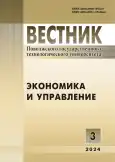External environment factors influencing the achievement of the goals of regional sectoral economic systems
- Authors: Smirnova E.V.1, Guseva E.P.1
-
Affiliations:
- Institute of Economics of the Ural Branch of the Russian Academy of Sciences
- Issue: No 3 (2024)
- Pages: 31-45
- Section: REGIONAL AND SECTORAL ECONOMICS
- URL: https://journal-vniispk.ru/2306-2800/article/view/282033
- DOI: https://doi.org/10.25686/2306-2800.2024.3.31
- EDN: https://elibrary.ru/GCXGWT
- ID: 282033
Cite item
Full Text
Abstract
Introduction. The formation of adaptive organizational and economic mechanisms in the regions and their contribution to the implementation of the import substitution policy while taking into account potential threats and opportunities include the creation of new sectoral structures and maintenance of existing ones that contribute to the effective use of the resource potential of the territories.
The purpose of the study is to clarify certain individual theoretical provisions on the functioning and development of regional sectoral economic systems, taking into consideration the impact of situational factors of the external environment upon them.
Methods. The following methods were used in the research: scientific abstraction, system analysis, analysis and synthesis, comparative analysis, analysis and generalization of document and published research data, sociological survey.
Research results. Based on the fact that a region is located on a territory with its specific sectoral structure, we conclude that sectoral structure acts as a determining factor in the formation of the regional economic policy directions and as an individual distinctive feature of a particular region. Factors characterizing the regional specifics in general and the business environment in particular are important for the development and sustainability of regional sectoral economic systems. The sustainability of the system is determined by the balance within the system of goals, strategies, methods, mechanisms and tools for managing the development of individual economic entities included in the system. The results of the influence of external factors on the development of the economy of the Orenburg Region are considered using the case of the regional sectoral economic system in the industrial sphere.
Conclusion. Organizational and economic support of the process of strategizing in the regional economy under conditions of high uncertainty of the external environment predetermines the need to identify the factors the influence of which, in certain situations, may represent a significant threat to or an opportunity for the development of the regional economic system. Particular attention should be given to the groups of factors that determine the advantages of the spatial location of economic facilities on the territory of the region, as well as the presence or absence of features that classify the economic space as a territory with a special regime of activity and characterize the regional specificity.
Full Text
About the authors
Elena V. Smirnova
Institute of Economics of the Ural Branch of the Russian Academy of Sciences
Author for correspondence.
Email: uadsev@mail.ru
SPIN-code: 1008-0319
Orenburg Branch, Doctor of Economic Sciences, Professor, Leading Researcher
Russian Federation, 11, Pionerskaya St., Orenburg, 460001Elena P. Guseva
Institute of Economics of the Ural Branch of the Russian Academy of Sciences
Email: uadsev@mail.ru
SPIN-code: 2325-5914
Orenburg Branch, Researcher
Russian Federation, 11, Pionerskaya St., Orenburg, 460001References
- Smirnova E. V. The purposeful orientation of the modification of the systems of planning industrial enterprises under the conditions of the market economy. Vestnik of the Orenburg State University. 2011;(8(127)):122–129. EDN: PATEHJ (In Russ.).
- Minakir P. A., Jurca N. G. Methodological foundations of spatial research in economics. Vestnik Rossijskoj Akademii Nauk. 2018;88(7):589–598. doi: 10.31857/S086958730000082-8; EDN: XZTWBV (In Russ.).
- Sadykova E. Ts., Mekush G. E., Sangadieva I. G., et al. Methodological approach to assessing the sustainable development of resource-extracting companies. Regional Problems of Transforming the Economy. 2024;(6(164)):219–229. doi: 10.26726/1812-7096-2024-6-219-229; EDN: ZKSYEC (In Russ.).
- Zlobin B. K., Belous E. O. Transformation and estimation of budgetary potential of Regions of Russia. News of the Tula State University. Economic and Legal Sciences. 2012;(1-1):424–436. EDN: RZDPSB (In Russ.).
- Afonichkin A. I., Moshkova T. A. System dyna¬mics synergy strategic development of a spatial-sectoral economic systems. Soft Measurements and Computing. 2019;(3(16)):20–28. EDN: UWLQSE (In Russ.).
- Ruban V. A. The development of territorial and sectoral socio-economic system of the region. Monograph. Ulan-Ude: Buryat State University named after D. Banzarov, 2013. 208 p. EDN: UDPFLZ (In Russ.).
- Danilova I. V., Rezepin A. V. Development of spatial economic systems: evolutionary approach. Bulletin of South Ural State University. Series “Economics and Management”. 2022;16(1):18–28. doi: 10.14529/em220102; EDN: UTRTZA (In Russ.).
- Glezman L. V., Urasova A. A. Significant factors of spatial and industrial development of region in conditions of digitalization. Vestnik of Astrakhan State Technical University. Series: Economics. 2022;(1):31–42. doi: 10.24143/2073-5537-2022-1-31-42; EDN: GGSWWV (In Russ.).
- Antonyuk V. S., Kornienko E. L., Vansovich E. R. The spatial development patterns of the Russian Federation productive forces in the current context. Russian Journal of Economic Theory. 2020;17(2):314–327. DOI: 10.31063/ 2073-6517/2020.17-2.6; EDN: CDIWHM (In Russ.).
- Simachev Yu. V., Yakovlev A. A., Golikova V. V. et al. Adaptation of Russian industrial companies to sanctions: first steps and expectations. Report to the XXIV Yasin (April) International Academic Conference on Economic and Social Development. Moscow: NRU “Higher School of Economics” Publ, 2023. 38 p. EDN: TXCUHT (In Russ.).
- Dubenko Yu. To be a tailwind and develop the Orenburg Region together: what is being done in the region to develop its economy. Komsomolskaya Pravda. 16 May 2023. Available from: https://www.orenburg.kp.ru/daily/27502.5/4762108/ [Accessed 15 June 2024] (In Russ.).
- Uraev N. N. Development of a methodology for strategic management of the implementation of the potential of the production system of a vertically integrated company. Monograph. Moscow: RUSAINS, 2023. 218 p. (In Russ.).
- Doroshenko Y. A., Starikova M. S., Ryapukhina V. N. Identification of industrial and innovative development models of regional economic systems. Economy of Regions. 2022;18(1):78–91. doi: 10.17059/ekon.reg.2022-1-6; EDN: UMTONS (In Russ.).
Supplementary files











